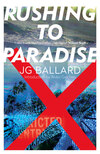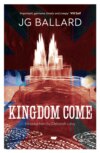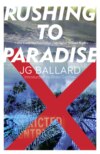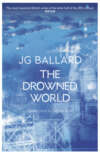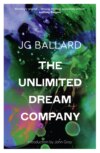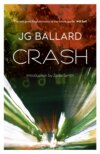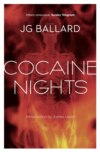Kitabı oku: «Rushing to Paradise», sayfa 2
She brushed the damp hair from his eyes and ran her hand over his muscular arms, as if reminding herself that he was still the pugnacious and lazy youth she had met one evening in Waikiki, dreaming of atomic islands and marathon swims. During the voyage from Papeete she had spared him from the more arduous tasks, leaving Kimo to shift the heavy sails and work the bilge pump, and Neil sensed that he was being saved for a more exacting role than that of expedition cameraman.
‘How long do we stay on Saint-Esprit?’ he asked.
‘Long enough to make the film. We can’t help the albatross yet, but we can show people what’s happening here.’
‘Doctor …’ Neil gestured at the deserted beach and the clouds of mosquitoes. ‘Nothing’s happening.’
‘Neil!’ Dr Barbara forced him to sit up. ‘Send some sort of current through that brain of yours. We’ve almost reached the year 2000 – let’s make sure the planet’s waiting for us when we get there.’
‘That’s why I came,’ Neil assured her. ‘I want to save the albatross, Dr Barbara.’
‘I know you do. I wish there were more young men like you. We’ve got to protect everything here, not just the albatross but every palm and vine and blade of grass.’ She waved away the mosquitoes that hovered over Neil’s lips. ‘We’ll even save the mosquito!’
Needless to say, she had forgotten to pack any repellent. Himself the son of a doctor, a London radiologist who had died three years earlier, Neil again wondered if Dr Barbara was a real physician. Through her damp shirt he could see the tattered underwear held together by safety pins, and the zip of her trousers tied into place with fuse wire. He followed her to the inflatable, which Kimo had readied for departure, its bows facing the sea. She sat on the rubber float, a worn hand touching the outboard, and stared in a bleak way at the waves. For all her calls to action, she seemed disoriented by the size of the atoll.
She rallied when Neil raised the camera and began to film her. A low cloud ceiling extended to the horizon, below which lay a grey, marbled air, the perfect film-light. Despite her ragged clothes, the sores on her lips and fraying hair, the camera lens instantly restored Dr Barbara’s confidence in herself. As always, Neil found himself drawn to this eccentric woman, and determined at whatever cost to protect her from reality.
Escorted by the mosquitoes, they set out to locate the airstrip, and followed the narrow beach under the overhang of palms. Kimo took the lead, machete in hand, pausing without comment whenever Dr Barbara stopped to rest. Waiting for her, Neil was aware of the radio mast high above the island, its antennae trailing them through the breaks in the forest canopy. A concrete blockhouse sat in a grove of tamarinds, a forgotten totem of the nuclear age that seemed more ancient than any Easter Island statue.
Rainwater leaked down the hillside, seeping between the moss-covered trees. After hiding among the ferns, a small stream fanned into a delta of silk-smooth ash and vented itself into the sea.
Neil bathed his feet in the cool shallows, the first fresh water he had felt on his skin since leaving Papeete. Dr Barbara knelt beside him and washed her arms and face. From a hip pocket she took a leather make-up pouch and combed her hair into damp waves. Dissatisfied with herself, she grimaced into the mirror and sucked the sores on her lips.
‘Not very good, but never mind.’
‘You look fine.’ Neil spoke sincerely, intrigued by the way in which this often scruffy middle-aged woman hovered on the edge of glamour. ‘Everyone will be impressed.’
‘You’re impressed, Neil. But that’s not what I meant. I want everyone to see how serious we are.’
‘You are serious.’ Tempted to tease, he added: ‘I’ll film you from your best side.’
‘Have I got a best side? What a dreadful thought.’
Neil filmed her as she followed Kimo through the forest, feet sinking into the spongy ground. The Hawaiian slashed at the ferns, exposing the rusty steel sections of a small-gauge railway. Everywhere lay the debris of Saint-Esprit’s earlier occupations. Wooden huts leaned on their worm-riddled stilts, roofs open to the sky, hibiscus and morning glory flowering between the floorboards. A prayer-shack of corrugated iron stood on a headland above the lagoon, surrounded by the graves of an overgrown cemetery laid out by the Catholic missionaries. The forest had long since reclaimed the modest farm plots. Breadfruit trees, jack and eucalyptus crowded together among the taro plants, wild yams and sweet potatoes.
Imposed on this smothered realm was the refuse left by the French engineers, a moraine of abandoned military equipment. Kimo rested on an empty fuel tank beside the railway line, hacking at the lianas that snared it to the ground. Cloudy wine bottles lay in a wooden crate at his feet, surrounded by truck tyres and coils of telephone wire. A second camera-tower stood among the deep ferns, its window-slits staring at nothing.
They crossed a drainage ditch and stepped through the screen of palms. The airstrip swept past them, freshly surfaced with pulverized coral, its eerie geometry forming the outlines of an immense white altar among the trees. A camouflaged radio-cabin stood in the undergrowth fifty yards from them, aerials pointing to the empty sky. At its southern limit the airstrip ended in a barrier of dunes, where an army bulldozer sat with its scoop sunk in the sand.
Swinging the machete in his hand, Kimo walked to the bulldozer and tapped its metal tracks. An empty beer can rested on the driver’s seat. Head raised, he stood stiffly in the strong wind as the sunlight flashed on the machete’s blade. Lost in some reverie of his Hawaiian kingdom, he at last turned and gave a dismissive wave, like a travel courier warning a party of visitors from an uninteresting site.
‘What is it, Kimo?’ Dr Barbara called. ‘Can you see anything?’
‘Albatross, doctor … just albatross.’
‘Albatross …?’ Dr Barbara seized Neil’s arm and hurried him across the runway. ‘Neil, the birds are still here! Get the camera ready.’
They reached the dunes and clambered up the slopes of churned sand, sinking to their knees in the black ash. Dr Barbara shielded her eyes from the wind and peered at the sky as Kimo strode down the beach to the headland beside the prayer-shack.
‘Kimo! Where are the albatross? I can’t see a single one.’
‘There are plenty, doctor.’ Kimo gestured in an offhand way at the hillocks of sand and beach-grass. ‘Every albatross you need.’
‘Kimo …?’
‘Over there.’
‘Dr Barbara …’ Neil lowered the camera, unsure whether to film her when she was caught off-guard. ‘They’re all around us. They’re not in the sky any more …’
A colony of albatross had nested among the hillocks, taking advantage of the wind that rose from the surface of the dunes. Their nests were little more than hollows in the sand, crudely lined with feathers and grass, but every one of them had been kicked apart. The heel-marks of heavy boots had stamped themselves into the rain-sodden ash. Fragments of broken shell trembled in the cool air, blurs of down quivering on their serrated edges. Dead chicks lay in the crushed grass, smeared with the yellow stomach oil that their parents had vented over them in their panic. Wings outstretched, dozens of the great birds rested at the water’s edge, clubbed to death as they tried to escape. The ruffled plumage glared against the black sand like ice-white blossoms thrown into a refuse pit.
‘Thirty-eight … nine …’
Kimo wandered among them, a stiff smile masking his face. The machete hung loosely in his hand, as if he were tired after cutting down the sky. Listening to his flat voice, Neil realized that the Hawaiian was counting the dead birds, and that in some way a finite number of fatalities would diminish the atrocity committed against the creatures.
‘Kimo …. why are they killing the birds?’
‘They need to extend the runway.’ Kimo spoke matter-of-factly. ‘On Midway the Air Force killed thirty thousand goonies last year. They get into the jet intakes.’
‘What about the French soldiers?’ Neil scanned the empty runway, as white as the feathers of the albatross. ‘They must be here somewhere.’
‘Maybe they’re bored. Killing is slow work …’
Unable to console the Hawaiian, Neil returned to Dr Barbara. She stood among the dead birds, hair floating from her forehead like threatening vapour above a volcano. As the wind stirred the plumage of the dead birds the beach seemed to shiver under her gaze. But her mouth was set in a curious grimace that was almost a smirk of satisfaction.
‘Neil, I want the world to see this. Make sure you include every bird. Especially the chicks.’
‘There are too many, doctor.’ Reluctantly, Neil raised the camera and searched for the wide-angle button. ‘They look like chrysanthemums …’
‘All of them! They deserve to be remembered. And don’t forget Kimo.’
But the Hawaiian had lost interest in the birds, and was walking towards a camera-tower that looked out over the lagoon to the detonation zone four miles away. The iron-grey cement, and the hieroglyph formed by the camera slits, reminded Neil of the gloomy bunkers that he and his father had explored at Utah Beach on the Normandy coast, remnants of the Nazi West Wall that outstared time.
At the northern end of the runway the French engineers had set up their camp. A wooden pier jutted into the lagoon, a cargo lighter moored against its landing stage. Crates filled with signals gear sat under the trees beside a storage shed, from which a set of landing lights and an aluminium water tower had been unloaded. But there was no sign of any nuclear or chemical warfare equipment. Saint-Esprit, Neil guessed with some disappointment, was no more than a refuelling stop on the air-run between Mururoa and Tahiti.
After filming Dr Barbara among the dead birds he wiped the chick entrails from his running shoes and followed her down the airstrip. She strode through the powdered coral, white dust rising at her heels, a dead albatross clasped in her arms. Her chin and forehead were streaked with blood, a warning to the sky to hold its breath. Neil had been unsettled by the fate of the huge birds, but he already realized that he was filming a well-rehearsed scene in the theatre of protest. Kimo climbed the water-tower and hung the banner from its spherical reservoir, while Dr Barbara sprayed her slogans across the green canvas roofs of the three barrack tents, slashing blades of gaudy crimson through the khaki fatigues hanging on a washing line. They posed together, native Hawaiian and English spinster, committed to their shared defence of the threatened Pacific.
Ten minutes later, as he replayed the sound-track to a critical Dr Barbara, Neil became aware that he was not the only person to film this contrived scene. A hundred yards from the airstrip, by the path that led up the hillside to the radio mast, three soldiers in French uniforms were watching the display. While his men waited beside him, smoking their cigarettes, the sergeant took a leisurely series of still photographs with his camera, like a tourist recording a quaint folkloric rite. After replacing the lens shroud, he beckoned his men forward, and together they strolled towards the airstrip.
‘They’re here! Kimo, take the camera!’ Dr Barbara snatched the video-camera from Neil’s hands and thrust it against Kimo’s chest. ‘Neil, climb the ladder and wrap the banner around your shoulders.’
‘Dr Barbara … shouldn’t we wait? The soldiers are armed.’
‘Neil, try to help me.’ Dr Barbara propelled him towards the ladder and forced his hands onto the metal rungs. For all the excitement, her eyes were calm, as if she had colluded with the French soldiers and was relieved to see them arrive. Before pushing him up the ladder she spoke rapidly to him: ‘Neil, there are millions of young people like you all over the world. They won’t listen to me but they’ll follow you.’
Kimo had dropped his machete to the ground. He knelt on the runway and, with an expertise that surprised Neil, began to film the approaching soldiers. He recorded Dr Barbara shouting into her megaphone, and ended with a close-up of an embarrassed Neil on the ladder, the banner draped across his chest.
‘Go, Kimo … now!’
Dr Barbara pulled the Hawaiian to his feet. He held her wrists, as if uncertain whether to leave, and then tore himself from her and ran across the airstrip towards the forest, camera in hand. When he reached the prayer-shack he paused among the graves, waiting for Dr Barbara to follow before plunging into the waist-deep ferns.
The French soldiers made no effort to pursue him. As Dr Barbara bellowed at them through the megaphone they put out their cigarettes, amused by this over-excited Englishwoman tripping over the dead bird at her feet. Dragging the banner with him, Neil jumped from the ladder and tried to wipe the blood from her arms.
‘Dr Barbara, let’s go. They’ll arrest us.’
‘I’m staying, Neil. I want to see this through. Kimo can show the film to the world.’
‘Doctor, the world isn’t interested …’
He was about to follow Kimo across the airstrip when the French sergeant raised his right hand. He unbuckled the flap of his holster and walked forward, pointing to Neil.
‘Arrête-toi! Ne bouge pas!’
Cursing Dr Barbara, Neil sprinted along the airstrip through the trail of bloody feathers. Kimo was running among the trees, retracing the railway line towards the beach with a lightness of foot that Neil had never suspected.
‘Kimo … wait! Kimo!’
He was still shouting at the Hawaiian when he heard the pistol shot behind him.
2
Protesting Too Much
The protest rally at the University of Hawaii campus had reached a climax, its rhetoric as inflated as the helium balloons, emblazoned with ecological slogans, that rose from their cradles beside the podium. Lying in his bed on the sixth floor of the Nimitz Memorial Hospital, Neil watched the familiar scene on his television set. He turned down the sound as the last speaker, a local basketball commentator turned eco-evangelist, began his address to the student audience.
This aggressive sermon, which Neil now knew by heart, combined religious fervour, high-flown sporting analogies and blatant threats against the French consul in Honolulu and any French tourists daring to defile the beaches of Waikiki. Buying a Citroën or an Hermès scarf was a sin equal to the destruction of ten acres of rain-forest or the murder of a hundred albatross.
The hospital was almost a mile from the rally, but through the open window Neil could hear the amplified voice reflected across the rooftops. Megaphones hectored him in his deepest dreams. Even when he pressed the sound mute on the remote control, his last defence against the protest movements, the repeated slogan ‘Save the Albatross’ seemed to drum from the loudspeaker. Every mention of the wandering albatross – no specimen of which, an amateur ornithologist in the kidney unit informed him, ever nested in the Hawaiian Islands – produced a spasm of pain in his injured foot.
‘Save the frigate bird,’ Neil muttered. ‘Save the quetzal …’
The bullet from the French sergeant’s pistol had struck the ball of his right foot, exiting between the metatarsal bones and causing what his doctors termed a partial amputation of the big toe. Six weeks later, Neil moved in a painful, one-legged hobble, a legacy of the infected muscle sheath which the Papeete paramedics had allowed to run out of control while the French authorities tried to resist the world-wide media clamour for his release.
The wound was still leaking when Neil at last flew to Honolulu. But the bloodied bandages on the television newscasts had been a propaganda coup whose impact rivalled the stigmata of a saint. A breathless Dr Barbara embraced him on his stretcher and assured the cameras that these few crimson drops redeemed the ocean of blood shed by the slaughtered birds. Had she aimed the pistol herself, Dr Barbara could not have found a more valuable target.
Even Neil’s mother and his step-father, Colonel Stamford, had been impressed by Neil’s celebrity. They flew from Atlanta to be with him during his first week at the Nimitz, and sat by his bed surrounded by the huge bouquets that endlessly arrived from well-wishers. Accepting a rose from Neil, his mother gazed at the blood-red petals as if they had been dipped into her son’s heart. Neil promised his step-father that he would join them in Atlanta as soon as he was strong enough to walk to the aircraft, but the colonel urged him to remain in Honolulu for at least a further month, perhaps seeing Neil’s fame as a therapeutic process in itself that might free the restless boy from his memories of his dead father.
A helium balloon sailed over the hospital car park, bearing the stylized image of an albatross. On the television screen the basketballing evangelist had begun his final peroration. Neil kept his thumb firmly on the sound mute, but the door of his room opened. Nurse Crawford, a keen windsurfer from Cape Town whom he had first met at a beach party in Waikiki, walked over to the set and turned up the sound.
‘… And let’s not forget someone who gave everything in the fight against ecological terrorism – Neil Dempsey, lying at this moment in the Nimitz. That French bullet he took was aimed at every one of us, at every albatross and dolphin and minke whale. We’re with you, Neil, lying right next to you in that bed of pain …’
Nurse Crawford playfully lifted Neil’s sheet, rolling her eyes as he shielded his crotch with the remote control.
‘Neil, who’s lying next to you? I just hope you haven’t given everything. We’re all waiting for a special treat.’
Neil pulled the sheet from her hands but allowed her to pinch his ribs. ‘I’ll save some for you, Carole.’
‘Hearts are bursting, Neil.’ She grimaced at the television screen. ‘Now, look who’s here. The great lady doctor, still itching to save the world. What do you think of her new hairdo?’
Neil rearranged his get-well telegrams. ‘It looks great. Dr Barbara’s all right. I like her.’
‘Of course you do – she nearly got you killed. Who can compete with that? But you take care, Neil …’
‘I’ll be fine. Don’t worry for me, Carole.’
‘That’s what you said before you left with Kimo.’ Still puzzled by Neil despite the weeks spent bathing and feeding him, Nurse Crawford sat on the bed. ‘Why did you sail to the island, Neil? You aren’t interested in the albatross.’
‘Maybe not. Saint-Esprit’s a nuclear test-site, like Eniwetok and Kwajalein Atoll. I wanted to see it.’
‘Why?’
Neil shrugged. ‘I don’t know yet. I didn’t get a chance to find out. Maybe it’s where the future begins.’
‘The future? Neil, all that atomic war stuff is over now.’
‘Not for me.’ Neil aimed the remote control at her and pressed the mute button. ‘The point about Saint-Esprit is that they never exploded a bomb there.’
‘So?’
‘It’s still waiting to happen. Life and death, Carole, things they’ve never heard about in Waikiki.’
‘They’ve heard about life and I’ll stick with that any day. It’s your lady friend Dr Rafferty I’m not sure about.’
Neil let this pass. ‘She wants to save the albatross. Is there something wrong with that?’
‘Maybe there is, Neil. Yes, I think there is …’
*
When Nurse Crawford had gone Neil returned to the protest rally. Dr Barbara had stepped to the podium, where she received a standing ovation from the action committee – a retired astronaut, two over-earnest academics, a public-spirited car-dealer and three wives of local businessmen. In phrases that Neil had learned to lip-read off the silent screen she saluted the students for their support and cash donations. Her blonde hair floated freely about the well-tailored shoulders of her safari suit, but her modest smile was firmly in place as her level blue eyes, steadied by some internal gyroscope, assessed the size of the audience and the likely take of dollar bills.
‘Save the phoenix …’ Neil murmured. The rally, for all the balloons and applause, had attracted fewer people than Dr Barbara’s previous jamborees. Indignation, even the fierce variety patented by Dr Barbara, had a short shelf life. The albatross was her trademark, that long-winged, ocean-soaring, guilt-bringing bird. But practical results, of the kind achieved by Greenpeace, Amnesty International and the Live Aid concerts of the 1980s, had eluded Dr Barbara. The French government still denied that nuclear testing would resume at Saint-Esprit. For all the footage of graffiti-scrawled camera-towers that Kimo had supplied to the TV networks, an anti-nuclear campaign could no longer bring in the crowds. Too many of the people at Dr Barbara’s rallies were tourists, elderly Japanese couples and family groups from Sydney or Vancouver, for whom an ecological protest meeting was an established part of the holiday street scene, along with the fire-breathers, pickpockets and nightclub touts. Dr Barbara was a minor media phenomenon, appearing with her bird-atrocity footage on chat shows and wild-life programmes. She attracted a troupe of dedicated admirers, but failed to enlist the support of the established animal rights groups.
Nonetheless, she was as undeterred as ever, and addressed the rally with all her old fervour. The salt-water ulcers had healed, along with the eye infection that she refused to allow the French doctors to treat with their antibiotics (‘tested on animals and third-world volunteers!’). She had put on weight, thanks to a regime of fund-raising dinners, and the micro-climate of TV studios had left her face attractively pale.
Neil remembered how she had cradled him in her arms as he was carried from the plane at Honolulu Airport – so different from the aggressive stance she had taken as he lay bleeding on the runway at Saint-Esprit, when she faced the pistol-waving French sergeant with the triumphant gaze of a huntress guarding her prey. Despite all her efforts, however, her audiences were declining.
‘Doctor, you’ll have to shoot me in the other foot …’
Neil massaged his aching calf, thinking of the bedraggled and eccentric woman he had first seen five months earlier outside a Waikiki hotel, shouting abuse at the doormen exasperated by her high-pitched English voice and the banner she waved in the faces of the guests.
Neil was leaving the hotel after a farewell dinner with his mother and step-father. Having completed his tour of duty in Hawaii, Colonel Stamford was being reassigned to a base in Georgia. Neil’s widowed mother had met the colonel soon after her husband’s death, while she worked as the catering officer at a U.S. officers’ club in London. Neil liked the amiable Californian, who was forever urging him to enlist in the Marine Corps and find a new compass-bearing in his life, and accepted the colonel’s suggestion that he join them in Honolulu.
Neil was still unsettled by the suicide of his father, a radiologist who had diagnosed his own lung cancer and decided to end his life while he could breathe without pain. But suicide was a suggestive act, as a tactless counsellor at the hospital had told Mrs Dempsey, often passing from father to son like a dangerous gene. Trying to distance himself from his memories of his father, Neil gave up any hopes of studying medicine. The vacuum in his life he filled with body-building, judo and long-distance swimming, lapping hundreds of lengths each week at his London pool. He swam the Thames, despite the efforts of the River Police to stop him, from Chelsea Bridge to the first lock at Teddington. Above all, he revelled in long night-swims, when he moved in a deep dream of exhaustion and dark water.
The powerful physique of this moody sixteen-year-old, and his plans to swim the English Channel at night, together appealed to Colonel Stamford, who talked to Neil of the great seas around Hawaii. Once he arrived, the Waikiki beach world swallowed him whole. He missed his girl-friend Louise, a highly strung but affectionate music student, and sent her video-cassettes of himself surfing near Diamond Head. Bored with his class work, he dropped out of high school and crewed on yachts, worked as a pool attendant and then found a part-time job as a projectionist at the university film school. During his spare time he prepared for the challenge he had set himself, the thirty-mile swim across the Kaiwi Channel from Makapuu Head to the neighbouring island of Molokai.
When his mother and Colonel Stamford told him of their imminent move to Georgia, Neil asked if he could remain in Honolulu for the summer. To his surprise, his mother agreed, but Neil was aware that in her vague way she had begun to reject him. An anxious and easily tired woman, she saw in his square shoulders and boxer’s jaw an upsetting reminder of her dead husband. She and the colonel settled Neil into a student rooming house near the university, and celebrated their departure with a last dinner in Waikiki. Afterwards Neil kissed his mother’s over-rouged cheek and accepted his step-father’s kindly bear-hug. He then walked through the lobby doors and straight into the quixotic and testing world of Dr Barbara Rafferty.
When he first arrived for dinner he had noticed the shabby, middle-aged woman in a threadbare cotton dress. She crouched between two limousines in the car park, unwrapping a paper parcel, and Neil assumed that she was a beggar or down-and-out, hoping to cadge a few dollars from the delegates to a maritime safety convention. Two hours later, when he left, she was still there, hovering around the ornamental fountain that faced the entrance. Seeing Neil emerge from the hotel, she waved a makeshift banner and shouted in a strong English voice:
‘Save the albatross! Stop oil pollution now!’
Before she could confront Neil the doormen bundled her away. Handling her roughly, they propelled her into the drive beyond the hotel gates and flung the banner onto the ground. She knelt beside it, skirt around her white thighs, a hand to her bruised chin.
Drawn by her English accent, Neil helped the woman to her feet. She accepted his handkerchief and wiped her tears, flowing from indignation rather than grief.
‘Are you one of the delegates?’ She frowned at his youthful face. ‘If they’re sending their midshipmen they really must have something to hide.’
‘I’m not a delegate.’ Neil tried to calm her trembling shoulders, but she pushed him away. ‘I’ve been saying goodbye to my mother and step-father. He’s a colonel in the U.S. Army.’
‘The American Army? One of the world’s greatest environmental threats.’ She brushed the dirt from her hands. ‘No use saying goodbye, they said goodbye to us a long time ago. Listen, do you have a car?’
‘I came by bus,’ Neil lied. The army-surplus jeep he had bought to please his step-father was parked a hundred yards along the beach, but Neil decided to distance himself from this unstable Englishwoman. As he folded the banner he noticed the slogan hand-painted in red ink. ‘“Save the Albatross”,’ he repeated. ‘Do they need saving?’
‘They certainly do. Still, I’m glad you’ve heard of the albatross.’
‘Everyone has.’ Neil gestured to the evening sky over Diamond Head and its corona of soaring birds. ‘They’re just a common sea-bird.’
‘They’ll soon be a lot less common. The French are killing them at Saint-Esprit, poisoning them by the thousand.’
‘That’s a shame …’ Neil tried to seem sympathetic. ‘But it’s a nuclear test island.’
‘You’ve heard of that, too? I’m impressed.’
A tourist party emerged from the hotel and waited by the limousines, but a dispute between the drivers and the courier left them standing in an uneasy huddle. Seeing her chance, the Englishwoman unwrapped her banner. In an effort to make herself presentable, she brushed the blonde hair from her high forehead and relaxed the muscles of her face, imposing a fierce smile on its warring planes. She pulled a bundle of leaflets from her bag and pressed them into Neil’s hands. ‘Start giving those out. You can tell the doorman you’re a guest at the hotel.’
‘Look … it’s too bad about the albatross, but I have to go.’ Neil was aware that at any moment his mother and the colonel might leave the hotel and be surprised to find him involved in this curious demonstration. Hiding his face behind the leaflets, he noticed that the Save the Albatross Fund invited contributions to the treasurer and secretary, Barbara Rafferty, at a children’s home in a poorer district of Honolulu.
‘Come on, don’t look so shy.’ The woman seemed amused by Neil. ‘Help me hold the banner – you don’t have to think everything out first. And why are you so muscular? Steroids aren’t good for the testicles. In a few years you won’t be any use to your girl-friends.’
‘I don’t need steroids …’ Neil released the banner, which blew against the woman, wrapping the red-lettered strip around her like a bandage. ‘Good luck, Mrs Rafferty.’
‘Dr Rafferty. You can call me Dr Barbara. Now, stand there and shout with me. Save the … albatross!’
Neil left her shouting at the bored tourists as they rolled away in their limousines towards the Waikiki nightclubs. Ecological movements had always failed to stir him, though he sympathized with activists who were trying to save the whale or protect the beaches where rare species of turtle laid their eggs after immense oceanic journeys. The whales and turtles were swimmers like himself. But the obsessive do-goodery of so many animal rights groups had a pious and intolerant strain. It was necessary to test drugs, like the antibiotic that cured the rare strain of pneumonia he contracted after swimming the Severn. His mother and Louise would go on using lipstick and mascara; to spare them from cancer of the lip or eye a few rabbits might usefully die in the laboratory rather than the cooking pot.
